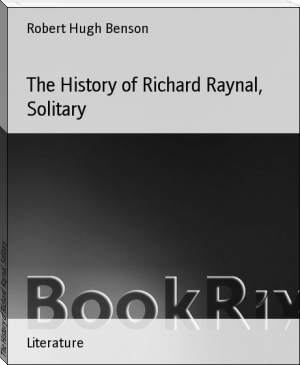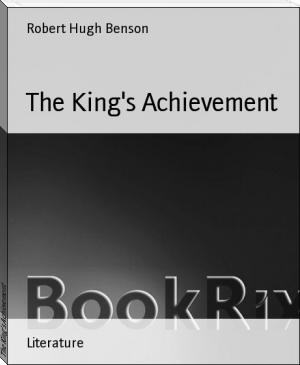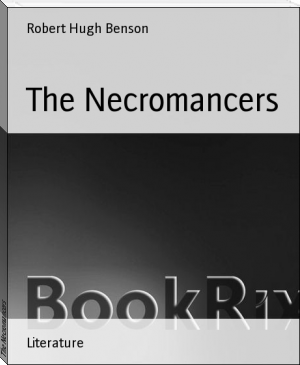The Necromancers by Robert Hugh Benson (motivational books for women .TXT) 📖

- Author: Robert Hugh Benson
- Performer: -
Book online «The Necromancers by Robert Hugh Benson (motivational books for women .TXT) 📖». Author Robert Hugh Benson
Well, there it had been; there was no doubt about it.... And Laurie was unacquainted with any mechanism that could produce it.
The clergyman too had seemed affected. He had watched, with turned-back head, the phenomenon from beginning to end, and at the close, with a long indrawing of breath, had looked once at Laurie, licked his dry lips with a motion that was audible in that profound silence, and once more dropped his eyes. The ladies had been silent, and all but motionless throughout.
Well, the rest had happened comparatively quickly.
Once more, after the lapse of a few minutes, the radiance had begun to reform; but this time it had emerged almost immediately, diffused and misty like a nebula; had hung again before the cabinet, and then, with a strange, gently whirling motion, had seemed to arrange itself in lines and curves.
Gradually, as he stared at it, it had begun to take the shape and semblance of a head, swathed in drapery, with that same drapery, hanging, as it appeared in folds, dripping downwards to the ground, where it lost itself in vagueness. Then, as he still stared, conscious of nothing but the amazing fact, features appeared to be forming—first blots and lines as of shadow, finally eyes, nose, mouth, and chin as of a young girl....
A moment later there was no longer a doubt. It was the face of Amy Nugent that was looking at him, grave and steady—as when he had seen it in the moonlight above the sluice—and behind, seen half through the strange drapery, and half apart from it, a couple of feet behind, the face of the sleeping medium.
At that sight he had not moved nor spoken, it was enough that the fact was there. Every power he possessed was concentrated in the one effort of observation....
He heard from somewhere a gasping sigh, and there rose up between him and the face the figure of the clergyman, with his head turned back staring at the apparition, and one hand only on the table, yet with that hand so heavy upon it that the whole table shuddered with his shudder.
There was a movement on the left, and he heard a fierce feminine whisper—
"Sit down, sir; sit down this instant...."
When the clergyman had again sunk down into his seat with that same strong shudder, the luminous face was already incoherent; the features had relapsed again into blots and shadows, the drapery was absorbing itself upwards into the center from which it came. Once more the nebula trembled, moved backwards, and disappeared. The next instant the radiance went out, as if turned off by a switch. The medium groaned gently and awoke.
Well, that had ended it. Laurie scarcely remembered the talking that followed, the explanations, the apologies, the hardly concealed terror of the young clergyman. The medium had come out presently, dazed and confused. They had talked ... and so forth. Then Laurie had come home, still trying to assimilate the amazing fact, of which he said that it could make no difference—that he had seen with his own eyes the face of Amy Nugent four months after her death.
Now here he was in bed on the following morning, trying to assimilate it once more.
It seemed to him as if sleep had done its work—that the subconscious intelligence had been able to take the fact in—and that henceforth it was an established thing in his experience. He was not excited now, but he was intensely and overwhelmingly interested. There the thing was. Now what difference did it make?
First, he understood that it made an enormous difference to the value of the most ordinary things. It really was true—as true as tables and chairs—that there was a life after this, and that personality survived. Never again could he doubt that for one instant, even in the gloomiest mood. So long as a man walks by faith, by the acceptance of authority, human or Divine, there is always psychologically possible the assertion of self, the instinct that what one has not personally experienced may just conceivably be untrue. But when one has seen—so long as memory does not disappear—this agnostic instinct is an impossibility. Every single act therefore has a new significance. There is no venture about it any more; there is, indeed, very little opportunity for heroism. Once it is certain, by the evidence of the senses, that death is just an interlude, this life becomes merely part of a long process....
Now as to the conduct of that life—what of religion? And here, for a moment or two, Laurie was genuinely dismayed. For, as he looked at the Catholic religion, he perceived that the whole thing had changed. It no longer seemed august and dominant. As he contemplated himself as he had been at Mass on the previous morning, he seemed to have been rather absurd. Why all this trouble, all this energy, all these innumerable acts and efforts of faith? It was not that his religion seemed necessarily untrue; it was certainly possible for a man to hold simultaneously Catholic and spiritualistic beliefs; there had not been a hint last night against Christianity, and yet, in the face of this evidence of the senses, Catholicism seemed a very shadowy thing. It might well be true, as any philosophy may be true, but—did it matter very much? To be enthusiastic about it was the frenzy of an artist, who loves the portrait more than the original—and possibly a very misleading and inadequate portrait. Laurie had seen for himself the original last night; he had seen a disembodied soul in a garb assumed for the purpose of identification.... Did he need, then, a "religion?" Was not his experience all-sufficing....?
Then suddenly all speculation fled away in the presence of the personal element.
Three days ago he had contemplated the thought of Amy with comparative indifference. She had been to him lately little more than a "test case" of the spiritual world, clothed about with the memory of sentiment. Now once more she sprang into vivid vital life as a person. She was not lost; his relations with her were not just incidents of the past; they were as much bound up with the present as courtship has a continuity with married life. She existed—her very self—and communication was possible between them....
Laurie rolled over on to his back. The thought was violently overwhelming; there was a furious, absorbing fascination in it. The gulf had been bridged; it could be bridged again. Even if tales were true, it could be bridged far more securely yet. It was possible that the phantom he had seen could be brought yet more forward into the world of sense, that he could touch again with his very hand a tabernacle enclosing her soul. So far spiritualism had not failed him; why should he suspect it of failure in the future? It had been done before; it could, and should, be done again. Besides, there was the pencil incident....
He threw off the clothes and sprang out of bed. It was time to get up; time to begin again this fascinating, absorbingly interesting earthly life, which now had such enormous possibilities.
IIThe rooms of Mr. James Morton were conveniently situated up four flights of stairs in one of those blocks of buildings, so mysterious to the layman, that lie not a very long way from Charing Cross. There is a silence always here as of college life, and the place is frequented by the same curious selections from the human race as haunt University courts. Here are to be seen cooks, aged and dignified men, errand-boys, and rather shabby old women.
The interior of the rooms, too, is not unlike that of an ordinary rather second-rate college; and Mr. James Morton's taste did not redeem the chambers in which he sat. From roof to floor the particular apartment in which he sat was lined with bookshelves filled with unprepossessing volumes and large black tin boxes. A large table stood in the middle of the room, littered with papers, with bulwarks of the same kind of tin boxes rising at either end.
Mr. Morton himself was a square-built man of some forty years, clean-shaven, and rather pale and stout, with strongly marked features, a good loud voice, and the pleasant, brusque manners that befit a University and public school man who has taken seriously to business.
Laurie and he got on excellently together. The younger man had an admiration for the older, whose reputation as a rather distinguished barrister certainly deserved it, and was sufficiently in awe of him to pay attention to his directions in all matters connected with law. But they did not meet much on other planes. Laurie had asked the other down to Stantons once, and had dined with him three or four times in return. And there their acquaintance found its limitations.
This morning, however, the boy's interested air, with its hints of suppressed excitement and his marked inattention to the books and papers which were his business, at last caused the older man to make a remark. It was in his best manner.
"What's the matter, eh?" he suddenly shot at him, without prelude of any kind.
Laurie's attention came back with a jump, and he flushed a little.
"Oh!—er—nothing particular," he murmured. And he set himself down to his books again in silence, conscious of the watchful roving eye on the other side of the table.
About half-past twelve Mr. Morton shut his own book with a slap, leaned back, and began to fill his pipe.
"Nothing seems very important," he said.
As the last uttered word had been spoken an hour previously, Laurie was bewildered, and looked it.
"It won't do, Baxter," went on the other. "You haven't turned a page an hour this morning."
Laurie smiled doubtfully, and leaned back too. Then he had a spasm of confidence.
"Yes. I'm rather upset this morning," he said. "The fact is, last night..."
Mr. Morton waited.
"Well?" he said. "Oh! don't tell if me you don't want to."
Laurie looked at him.
"I wonder what you'd say," he said at last.
The other got up with an abrupt movement, pushed his books together, selected a hat, and put it on.
"I'm going to lunch," he said. "Got to be in the Courts at two; and...."
"Oh! wait a minute," said Laurie. "I think I want to tell you."
"Well, make haste." He stood, in attitude to go.
"What do you think of spiritualism?"
"Blasted rot," said Mr. Morton. "Anything more I can do for you?"
"Do you know anything about it?"
"No. Don't want to. Is that all?"
"Well, look here;" said Laurie.... "Oh! sit down for two minutes."
Then he began. He described carefully his experiences of the night before, explaining so much as was necessary of antecedent events. The other during the course of it tilted his hat back, and half leaned, half sat against a side-table, watching the boy at first with a genial contempt, and finally with the same curious interest that one gives to a man with a new disease.
"Now, what d'you make of that?" ended Laurie, flushed and superb.
"D'you want to know?" came after a short silence.
Laurie nodded.
"What I said at the beginning, then."
"What?"
"Blasted rot," said Mr. Morton again.
Laurie frowned sharply, and affected to put his books together.
"Of course, if you take it like that," he said. "But I don't know what respect you can possibly have for any evidence, if...."
"My dear chap, that isn't evidence. No evidence in the world could make me believe that the earth was upside down. These things don't happen."
"Then how do you explain...?"
"I don't explain," said Mr. Morton. "The thing's simply not worth looking into. If you really saw that, you're either mad or else there was a trick.... Now come
 Reading books romantic stories you will plunge into the world of feelings and love. Most of the time the story ends happily. Very interesting and informative to read books historical romance novels to feel the atmosphere of that time.
Reading books romantic stories you will plunge into the world of feelings and love. Most of the time the story ends happily. Very interesting and informative to read books historical romance novels to feel the atmosphere of that time.




Comments (0)